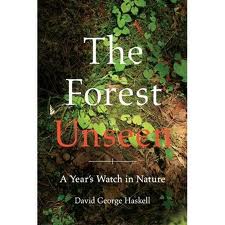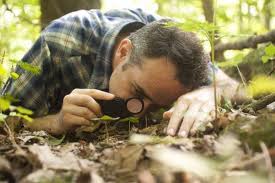David George Haskell: The Forest Unseen
February 16, 2013 by David
Filed under Non-Fiction, WritersCast
 9780143122944 – Penguin – paperback – $16.00 (ebook versions available, hardcover also)
9780143122944 – Penguin – paperback – $16.00 (ebook versions available, hardcover also)
Most of us are not very good at seeing the details in the world that surrounds us. We’re in a hurry, we’re overloaded with information, and we don’t really have the patience for the kind of looking that it takes to absorb and think about that kind of information.
The brilliant geographer, Carl Ortwin Sauer observed this about naturalists:
“Much of what [they] identify and compare lies outside of quantitative analysis. Species are not recognized by measurements but by the judgment of those well experienced in their significant differences. An innate aptitude to register on differences and similarities is joined to a ready curiosity and reflection on the meaning of likeness and unlikeness. There is, I am confident, such a thing as the “morphologic eye,” a spontaneous and critical attention to form and pattern. Every good naturalist has it…”
This is a fairly apt description of the work that naturalist David George Haskell undertook before writing The Forest Unseen: A Year’s Watch in Nature. And what a beautiful book it is!
Haskell is a biologist at the University of the South in Sewanee, Tennessee. He located a small piece of old growth forest nearby (old growth forest typically still exists in relatively tiny pockets in places where the terrain was too difficult for loggers to get into). With a certain nod to Buddhism, Haskell found a one meter by one meter square piece of forest he termed his mandala, and committed to spending a full year in close observation of this tiny sampling of an original and relatively undisturbed ecosystem.
Over the course of that year, he intrepidly sat and watched, and sometimes closely examined with a magnifying glass, what happened in his square meter of land. Each time he visited what ultimately became his meditation place, he recorded what he saw, and then researched and wrote about what had happened during that day. Of course this sounds mundane and almost plodding. And in lesser hands, this would just be a perhaps valiant exercise in close observation,. But it’s in the writing and the meditative exploration that Haskell was able to transform his seen experience into magical prose explorations of nature and what it means to us.
Finding a tick on him leads to a discourse on the life cycle of the tick that is worth re-reading several times. Hearing a chickadee in winter leads him to write about the amazing ways that these little birds survive the winter. Finding a golf ball in his sacred space (this may be a piece of wilderness but it’s boundaries by a nearby golf course) provides Haskell with the opportunity to explore the meaning of what is the definition of “natural” and the relationship of humans to nature.
David Haskell writes beautifully about nature, but as well, writes brilliantly about the ideas that closely examining the natural world inspire in an intelligent and perceptive human being. You can read this beautiful book simply to learn a great deal about a wide range of creatures and plants that we often take for granted, how an ecosystem works across time and changing seasons, and how in fact any of us could learn more by close observation. You can also read this book simply for the sheer beauty of the writing, and the brilliance of its descriptive passages. Haskell has extended beyond scientific or nature writing with a poetic and spiritual grace and the power of contemplative thought to create something very special and uniquely his own.
This is a book I have been buying frequently to give to friends and family (I am related to two active biologists), and recommend to everyone as one of my favorites. It was a great pleasure to talk to David Haskell about his work. I’ve been enjoying reading his blog, called Ramble, now on a regular basis, it’s a wonderful journey for anyone interested in the natural world and how to see it clearly.
Haskell holds degrees from the University of Oxford (B.A. in Zoology) and from Cornell University (Ph.D. in Ecology and Evolutionary Biology). He is Professor of Biology at the University of the South, where he has served both as Chair of Biology and as an Environmental Fellow with the Associated Colleges of the South. He is a Fellow of the American Council of Learned Societies and was granted Elective Membership in the American Ornithologists’ Union in recognition of “significant contributions to ornithology.” He served on the board of the South Cumberland Regional Land Trust, where he initiated and led the campaign to purchase and protect a portion of Shakerag Hollow, where the The Forest Unseen is set, a forest that E. O. Wilson has called a “cathedral of nature.” David Haskell lives in Sewanee, Tennessee, where he and his wife, Sarah Vance, run a micro-farm (with goat milk soaps available for purchase at Cudzoo Farm’s pretty cool website).
Note to listeners – I read this book in its lovely Viking hardcover edition, this interview is being posted in February, 2012; as of the end of March 2012, the paperback edition will be available. The cover here is of the hardcover edition.
Podcast: Play in new window | Download

Comments
One Response to “David George Haskell: The Forest Unseen”Trackbacks
Check out what others are saying about this post...[…] David George Haskell, Professor of Biology at Sewanee: The University of the […]